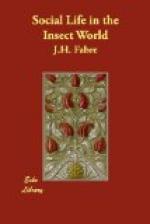In the case of the majority of insects the process of education is unknown, or summary in the extreme. The insect has only to select a grazing-ground upon which its family will establish itself the moment it is hatched; or a site which will allow the young to find their proper sustenance for themselves. There is no need of a father in these various cases. After mating, the discarded male, who is henceforth useless, drags out a lingering existence of a few days, and finally perishes without having given the slightest assistance in the work of installing his offspring.
But matters are not everywhere so primitive as this. There are tribes in which an inheritance is prepared for the family which will assure it both of food and of shelter in advance. The Hymenoptera in particular are past-masters in the provision of cellars, jars, and other utensils in which the honey-paste destined for the young is stored; they are perfect in the art of excavating storehouses of food for their grubs.
This stupendous labour of construction and provisioning, this labour that absorbs the insect’s whole life, is the work of the mother only, who wears herself out at her task. The father, intoxicated with sunlight, lies idle on the threshold of the workshop, watching the heroic female at her work, and regards himself as excused from all labour when he has plagued his neighbours a little.
Does he never perform useful work? Why does he not follow the example of the swallows, each of whom brings a fair share of the straw and mortar for the building of the nest and the midges for the young brood? No, he does nothing; perhaps alleging the excuse of his relative weakness. But this is a poor excuse; for to cut out little circles from a leaf, to rake a little cotton from a downy plant, or to gather a little mortar from a muddy spot, would hardly be a task beyond his powers. He might very well collaborate, at least as labourer; he could at least gather together the materials for the more intelligent mother to place in position. The true motive of his idleness is ineptitude.
It is a curious thing that the Hymenoptera, the most skilful of all industrial insects, know nothing of paternal labour. The male of the genus, in whom we should expect the requirements of the young to develop the highest aptitudes, is as useless as a butterfly, whose family costs so little to establish. The actual distribution of instinct upsets our most reasonable previsions.
It upsets our expectations so completely that we are surprised to find in the dung-beetle the noble prerogative which is lacking in the bee tribe. The mates of several species of dung-beetle keep house together and know the worth of mutual labour. Consider the male and female Geotrupes, which prepare together the patrimony of their larvae; in their case the father assists his companion with the pressure of his robust body in the manufacture of their balls of compressed nutriment. These domestic habits are astonishing amidst the general isolation.




